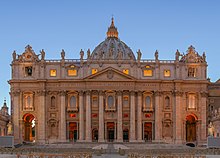
Back Stille Messe German Misa rezada Spanish Messe basse French Misa Rendah ID Messa bassa Italian Missa baixa Portuguese
| Part of a series on the |
| Catholic Church |
|---|
 |
| Overview |
|
|
Low Mass (Latin Missa Privata)[1] is a Tridentine Mass defined officially in the Code of Rubrics included in the 1962 edition of the Roman Missal as a Mass in which the priest does not chant the parts that the rubrics assign to him.[2] A sung Mass celebrated with the assistance of sacred ministers (deacon and subdeacon) is a High or Solemn Mass; without them it is a Missa Cantata.[3]
- ^ Schaefer, Edward E. (2008). Catholic Music Through the Ages: Balancing the Needs of a Worshipping Church. LiturgyTrainingPublications. ISBN 9781595250209., p. 45.
- ^ "Missarum species duae sunt: Missa in cantu et Missa lecta. Missa dicitur in cantu, si sacerdos celebrans partes ab ipso iuxta rubricas cantandas revera cantu profert: secus dicitur lecta (Code of Rubrics, 271); "Masses are of two kinds: sung Masses (in cantu) and low Masses (Missa lecta)). A Mass is called a sung Mass, when the celebrant actually sings those parts which the rubrics require to be sung; otherwise it is called a low Mass" (translation by Rev. Patrick L. Murphy).
- ^ Missa in cantu porro, si celebratur cum assistentia ministrorum sacrorum, appellatur Missa solemnis: si celebratur absque ministris sacris, vocatur Missa cantata" (Code of Rubrics, 271); "a sung Mass, when celebrated with the assistance of sacred ministers, is called a solemn or High Mass (Missa solemnis); when celebrated without sacred ministers, it is called a Missa cantata (translation by Rev. Patrick L. Murphy).